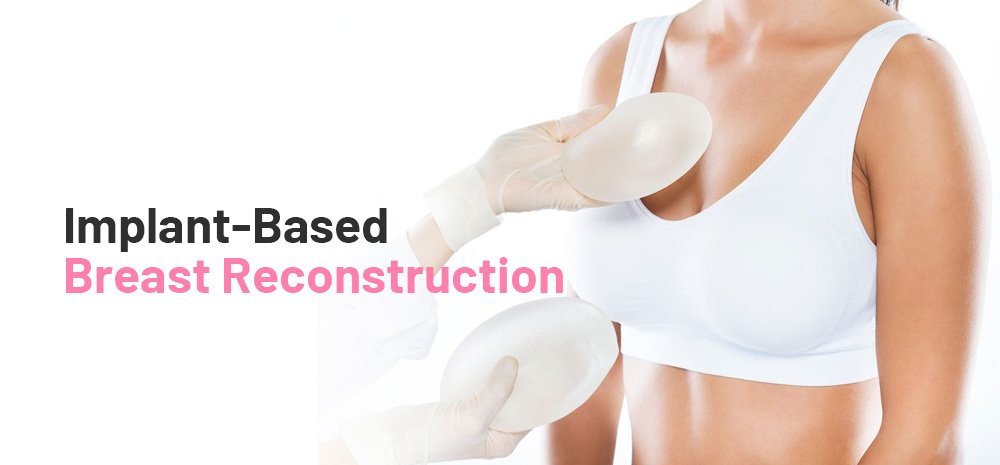
What is Implant-based breast reconstruction?
In implant-based breast reconstruction, a breast implant is used to build a breast mound following a mastectomy (removal of the breast). The implant can be used alone or in conjunction with tissue from other body parts to rebuild the breast. It is normally implanted behind the chest muscle. The procedure can be carried out right away following a mastectomy or put off until the patient has fully recovered.
One option for reshaping your breast after mastectomy is to use a breast implant. It usually necessitates at least two surgeries.
- The initial procedure involves inserting a tissue expander, a flat “water balloon” that will be gradually inflated (expanded) during office visits until the desired size is obtained.
- The tissue expander is replaced with a breast implant in the second procedure. Additional treatments or revisions to improve the overall appearance could be performed to repair the nipple-areola area.
The tissue expander is replaced with a breast implant in the second procedure. Additional treatments or revisions to improve the overall appearance could be performed to repair the nipple-areola area.
Two main types of implants are used for breast reconstruction: silicone and saline.
Silicone implants are filled with silicone gel, which is a thick, sticky substance that mimics the feel of natural breast tissue. They are considered to have a more natural feel than saline implants but have a higher risk of rupture.
Saline implants are filled with sterile salt water. They have a lower risk of rupture than silicone implants, but they may feel less natural to the touch and can give the breast a more “rounded” look.
Additionally, there are two more recent types of breast implants, which are:
- Stable implants, or gummy bear implants, are filled with cohesive silicone gel that holds its shape even if the implant shell is punctured.
- Autologous fat transfer, or fat grafting, is a technique in which fat is taken from one area of the body (such as the stomach or thigh) using liposuction and then injected into the breast to restore volume.
The choice of implant will depend on the patient’s individual needs and preferences and the surgeon’s recommendation.
How are implant procedures done?
A plastic surgeon typically performs the implant-based breast reconstruction procedure, which can be done in stages. The procedure may involve several steps, including:
- Mastectomy: The breast tissue is removed, either as part of a breast cancer treatment or as a preventative measure.
- Tissue expansion: A tissue expander may be inserted under the chest muscle or skin to stretch the skin and muscle to make room for the implant. The expander is gradually filled with saline over several weeks to achieve the desired size.
- Implant placement: Once the skin and muscle have been stretched enough, the tissue expander is removed, and the breast implant is inserted. The implant can be placed behind the chest muscle or under the breast tissue.
- Nipple reconstruction: If desired, a nipple reconstruction can be performed using skin, fat, and tissue from other body parts to create a new nipple and areola.
- Final Surgery: Depending on the case, the patient may need a final procedure to adjust and finish the reconstruction; this can include revision surgeries, adjusting the implant size, or touch-up procedures.
It’s important to note that the procedure and recovery time can vary depending on the individual case and the type of surgery performed. To ensure the best possible outcome, it’s important to have realistic expectations and follow the surgeon’s instructions for post-operative care.
Things to think about before getting implants
Here are some things to consider before getting implant-based breast reconstruction:
- The recovery process: Breast reconstruction surgery can be a major procedure, and the recovery process can be long and uncomfortable. It’s important to understand the recovery process and the potential risks and complications before deciding.
- The type of implant: Several types of implants are available, each with its own advantages and disadvantages. It’s important to discuss the options with a qualified surgeon to choose the one that’s right for you.
- The size and shape of the implant: It’s important to have realistic expectations about the size and shape of the implant. The surgeon will help you choose an implant that looks and feels natural, but the final result will depend on your anatomy and healing process.
- The cost: Breast reconstruction can be costly and may not be covered by insurance. It’s important to discuss the cost with the surgeon and find out if your insurance plan covers the procedure.
- The need for additional surgeries: Some patients may need additional surgeries to achieve the desired result. It’s important to understand that the surgery may not be a one-time procedure and that additional surgeries may be needed.
- The emotional aspect: Breast reconstruction can be an emotional process, and it’s important to have a strong support system in place. It’s also important to be aware of the psychological impact of the surgery and to have realistic expectations about the final result.
- Alternative options: There are alternative options for breast reconstruction, such as breast prostheses or no reconstruction at all. It’s important to discuss all options with a qualified surgeon and to choose the one that’s right for you.
Final Thoughts
Dr. Mansi Chowhan is a skilled surgical oncologist with more than 11 years of experience. During her post-graduation, she received a gold medal. She specialises in head and neck surgery and reconstructive surgeries, including breast oncoplasty. Dr. Mansi has over 11 years of expertise and has previously worked with some of the top hospitals in the Delhi-NCR area, including Asian Institute of Medical Sciences, Artemis Hospital, Paras Hospital, and Fortis Healthcare (Delhi & Gurgaon) (Faridabad).
More Expertise
EXCELLENT






